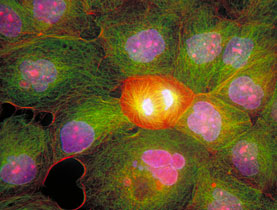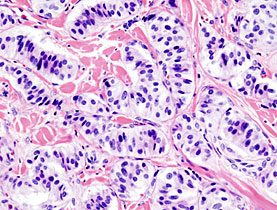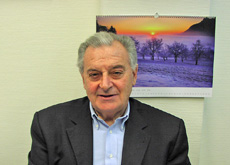Shooting cancer

Sharing the experience of grappling with breast cancer has been extremely cathartic and a helpful insight to other women, says US filmmaker Lori Benson.
swissinfo talked to Benson about her documentary film Dear Talula, a compelling portrait of a mother diagnosed with breast cancer shortly after the birth of her daughter.
The film is being screened on Saturday at the Reel Lives: The Cancer Chronicles international film festival in Geneva, the first-ever documentary film competition on cancer.
The raw, emotionally charged yet graceful film retells Benson’s abrupt transition from new mother to a patient with breast cancer, revealing great insight into her struggle with a mastectomy and life afterwards.
Dear Talula was aired in the United States on the cable television network Cinemax in October 2007 and has featured in several film festivals.
swissinfo: Why did you decide to make a film about your experience of breast cancer as a young mother?
Lori Benson: When I was diagnosed, my daughter was only 14-months-old. My husband at the time said, ‘Shall we bring a camera to the doctor’s office?’ and I said, ‘No, absolutely not’, but the next day someone was there – a friend Pete – who started filming. I wasn’t consciously making a film; I was being filmed.
Two months after the surgery and before I started chemo, I looked at all these tapes and I was astonished that I had this footage, looking at myself going through this experience. Then I chose to be personally in charge of it.
The initial objective was to leave something to Talula in case I die, or if I live that she could see this time of my life. Then it evolved into a film to share with an audience.
I started making a film on what would be really important for women to see who are going through cancer and to de-mystify cancer for the general public. It was a beautifully cathartic experience to make the film.
swissinfo: What are some of the general misconceptions about cancer?
L.B.: First of all, there’s this notion of a death sentence; when people hear you have cancer they think ‘how long do you have?’
Also, people assume that having chemo means that you can’t move, you’ll be on your couch for six months and won’t function. I got up every day and fed Talula, cared for her and went about my life.
In terms of my self-esteem and my attitude about my body, I wasn’t completely destroyed.
It’s a terrible thing to have a part of your body cut out, but what makes a woman sensual, sexy and appealing is not just the exterior body part but what you feel about inside, and if you can still love yourself and accept yourself with that change you are empowered and will be ok.
swissinfo: What do you think of the idea of a film festival devoted to cancer?
L.B.: There will always be cancer and the need for people to see the human side. It will really help doctors, cancer patients and survivors.
I feel honoured that they chose Dear Talula and that it’s part of something important.
The value of a film festival connected to a major international conference gives people a chance to see how people deal with the problem in South Africa, Romania, or other parts of the world.
swissinfo: Were you surprised by the broad appeal and impact of your film?
L.B.: I’ve exposed something, but the feedback makes it all worthwhile.
I have received hundreds and hundreds of emails from people. I didn’t think the range would be so broad. I had letters from daughters who thanked me for showing them what their mothers had been through but couldn’t express. The film made them less afraid to talk to their mothers and made them closer.
I also received a ton from cancer survivors who thanked me for sharing a story which they say is theirs.
swissinfo: Amid the profound experience of having breast cancer, what have been some of the more life-affirming moments?
L.B.: As women we are so attached to our beauty and this can be such a shameful experience. As a young woman I was obsessed with my breasts, so I had to accept that loss and change, and surprisingly I took it well. I grew a lot from that.
Since the film came out I’ve been blessed, as it’s appeared in several film festivals, I’ve written a few articles and I’ve been invited to medical schools, hospitals, cancer centres and universities to show the film.
I’m sometimes surprised at how meaningful the film is for other people as it is so personal but in good storytelling if the personal is universal you have succeeded.
swissinfo-interview: Simon Bradley
Lori Benson’s film Dear Talula is one of the finalists to be screened in the Reel Lives: The Cancer Chronicles international film festival in Geneva, the first-ever international documentary film competition on cancer.
The line-up also includes 2007 Oscar winner Freeheld and other films from 16 countries worldwide. The finalists were chosen from over 250 entries.
The festival is taking place from August 28-30 alongside the World Cancer Congress in Geneva. It is organised by the International Union Against Cancer (UICC), the leading international non-governmental organisation dedicated exclusively to global cancer control.
The festival aims to raise awareness about the complex realities of cancer, to shatter taboos and myths surrounding the disease.
The programme for the festival will include 15 public service announcements, 10 personal stories, four reportage films, and four educational films.

In compliance with the JTI standards
More: SWI swissinfo.ch certified by the Journalism Trust Initiative












You can find an overview of ongoing debates with our journalists here . Please join us!
If you want to start a conversation about a topic raised in this article or want to report factual errors, email us at english@swissinfo.ch.